Top 10 Immune Support Foods for Health

Written by
Robert Kelly
Reviewed by
Prof. Benjamin Murphy, Ph.D.Citrus and red peppers are essential immune support foods rich in vitamin C
Probiotic yogurt enhances gut health where 70% of immune cells reside
Zinc from shellfish and poultry directly supports immune cell development
Vitamin D regulates immune responses and reduces inflammatory markers effectively
Combine foods strategically like spinach with peppers for maximum nutrient absorption
Lifestyle habits including sleep and stress management amplify dietary immunity benefits
Article Navigation
Your immune system acts as your body's defense team, protecting you daily. Taking immune-support foods provides natural defense protection that is far superior to pills. Whole foods, such as oranges and broccoli, offer complete packages of nutrients that supplements cannot provide. The foods contain vitamins, fiber, and antioxidants that work together, making real food the best defense strategy.
We will discuss 10 immune-boosting foods you can add to your meals now and explore the nutrients, such as vitamin C and zinc, that they provide. How changing lifestyle habits, such as sleep and stress management, can enhance the effectiveness of these foods. Simple upgrades in your daily life can help create a strong immune system without requiring perfection. Here are some things you can do now. Make one easy change and add others from there.
Essential Nutrients for Immunity
Vitamin C energizes your white blood cells to battle the intruders. This vitamin is abundant in citrus fruits, such as oranges, in the plant form. At the same time, shellfish would deliver the animal form. For best absorption, also include spinach, a rich source of iron. This nutrient is best obtained from whole foods, rather than pills. The body uses vitamin C for immediate defense purposes.
Vitamin D controls your immune reactions and reduces inflammation. Get this from mushrooms and fatty fish such as salmon. Always eat this with healthy fat, such as avocado. The fat helps your body get this defender nutrient fully. Supplements do not have these natural combinations.
Zinc shapes immune cells that roam your body. Oysters contain the animal version, while pumpkin seeds contain the vegetable type. Eat them with protein, such as chicken, for the best effect. This mineral works more effectively from foods than from isolated forms. Your defender system depends on taking a steady supply of zinc.
Selenium is involved in exciting immune function without hyperreaction. Great natural sources of selenium, a plant variety, are Brazil nuts. The animal variety is found in food such as tuna. Combine these with foods naturally rich in vitamin E, such as almonds. These two combinations will help protect cell membranes from damage. Whole foods will combine these nutrients in a perfect balance for you.
Vitamin D + Healthy Fats
- Synergy: Vitamin D requires dietary fats for optimal absorption in the small intestine
- Pairing: Serve salmon with avocado or cook mushrooms in olive oil
- Benefit: Increases vitamin D bioavailability by 30-50% for better immune regulation
Vitamin C + Iron
- Synergy: Vitamin C converts plant-based iron into more absorbable form
- Pairing: Combine spinach (iron) with bell peppers (vitamin C) in salads
- Benefit: Boosts iron absorption by 2-3 times for improved immune cell oxygen transport
Zinc + Protein
- Synergy: Animal proteins enhance zinc absorption through peptide transporters
- Pairing: Enjoy oysters with chicken or lentils with Greek yogurt
- Benefit: Maximizes zinc utilization for optimal white blood cell development
Vitamin A + Healthy Fats
- Synergy: Fat-soluble vitamin A requires lipids for efficient intestinal uptake
- Pairing: Roast sweet potatoes with olive oil or add avocado to carrot salad
- Benefit: Increases vitamin A absorption by 40-60% for stronger mucosal barriers
Selenium + Vitamin E
- Synergy: These antioxidants regenerate each other during free radical neutralization
- Pairing: Combine Brazil nuts with sunflower seeds in trail mix
- Benefit: Creates continuous antioxidant protection for immune cell membranes
Top 10 Immune Support Foods
Citrus fruits such as oranges pack 70mg of vitamin C in a medium fruit. This substance fuels the white blood cells, which are your body's front-line soldiers. Eat them raw or zest salad dressings to retain every drop of flavor. Red bell peppers supply even more vitamin C for weight. One cup of chopped pepper provides 190mg of the vitamin, thus doubling your daily intake.
Garlic, when crushed, acts as your natural enemy against germs. The allicin in garlic stimulates T cells that target and eliminate invaders in the body. To be fully effective, first chop the garlic and then wait 10 minutes before cooking it. This allows it to achieve its full force as a protector. Add it raw in salad dressings for the best immune power.
Broccoli offers a detox boost with sulforaphane. Steam for 3 minutes to keep 90% of nutrients. One cup meets 135% of daily vitamin C requirements. Pair with lemon juice to triple iron absorption. This green powerhouse protects your cells every day.
Shellfish, such as oysters, yield 74mg of zinc per 100g. Zinc helps build immune cells that patrol your body. Cook to an internal temperature of 145°F to ensure safe pathogen elimination. Eat them with foods that contain vitamin C to support a healthy immune system. Your immune system relies on this daily supply of the essential mineral.

Citrus Fruits
- Vitamin C content: 70mg per medium orange (2.5oz) supports white blood cell production to combat infections
- Preparation tip: Add zest to salads for concentrated flavonoids that enhance antioxidant activity
- Daily serving: One large grapefruit provides 100% daily vitamin C needs (90mg)
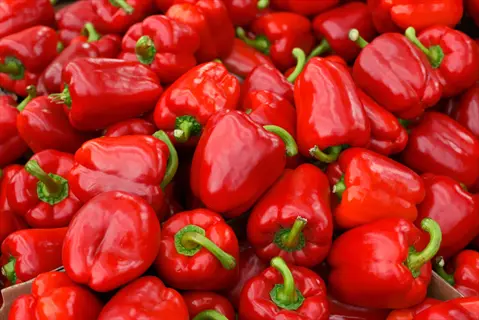
Red Bell Peppers
- Nutrient density: 128mg vitamin C per 100g (3.5oz) - triple an orange's concentration per weight
- Immune synergy: Beta-carotene converts to vitamin A for reinforced mucus membranes against pathogens
- Serving idea: Slice raw into hummus dip to preserve heat-sensitive vitamins
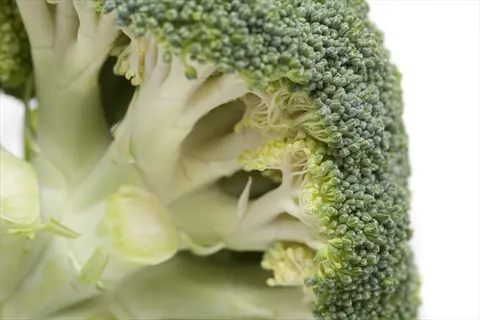
Broccoli
- Key compounds: Sulforaphane antioxidant activates detox enzymes that remove harmful substances
- Cooking method: Steam 3-4 minutes to retain 90% of vitamins A, C, E versus boiling
- Nutrient profile: One cup (91g) delivers 135% daily vitamin C and 14% vitamin A needs
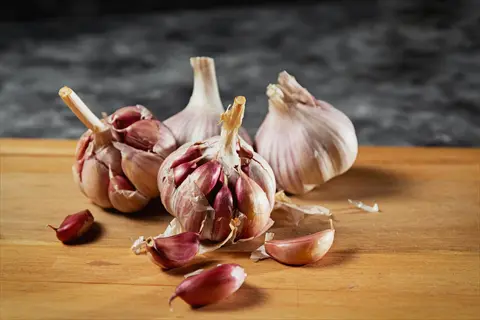
Garlic
- Active component: Allicin boosts disease-fighting T-cells when crushed and exposed to air
- Usage guidance: Consume raw in dressings or add at end of cooking to preserve immune compounds
- Research note: Regular intake may shorten cold duration by stimulating immune response

Spinach
- Nutrient combination: Iron (0.8mg/30g) and vitamin C work together for optimal oxygen transport
- Prep science: Light sautéing breaks down oxalic acid to double vitamin A absorption
- Serving size: Two cups (60g) raw provides 120% daily vitamin K for inflammation control
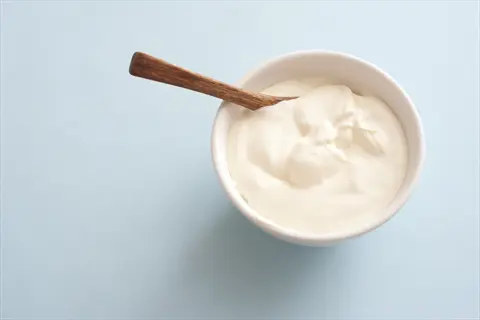
Yogurt
- Probiotic action: Live cultures balance gut microbiome where 70% of immune cells reside
- Selection tip: Choose plain varieties with <5g sugar per serving to avoid inflammation
- Enhancer: Add berries for extra vitamin C and prebiotic fiber to feed beneficial bacteria
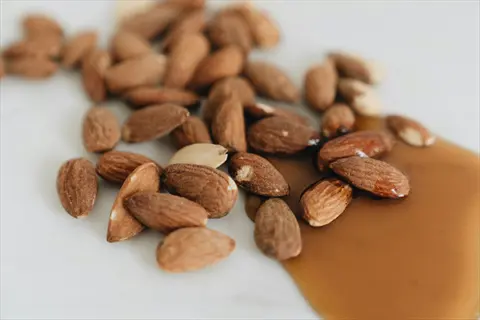
Almonds
- Vitamin E role: 7mg per ounce (28g) protects immune cell membranes from oxidative damage
- Healthy fats: Monounsaturated oils enhance absorption of fat-soluble vitamins like vitamin A
- Daily portion: 23 almonds provide 50% daily vitamin E - crucial for elderly immune function

Green Tea
- Antiviral compound: EGCG antioxidant inhibits viral replication by blocking enzyme activity
- Brewing method: Steep 2-3 minutes at 175°F (80°C) for maximum antioxidant release
- Intake guidance: 2-3 cups daily associated with lower cold incidence in population studies
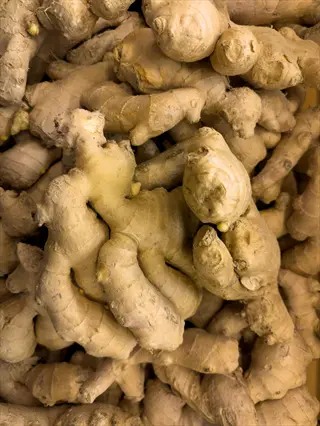
Ginger
- Anti-inflammatory: Gingerol reduces sore throat inflammation and nausea during illness
- Usage forms: Grate raw into teas or mince for stir-fries to preserve active compounds
- Dosage note: One tablespoon (6g) of fresh ginger delivers potent anti-inflammatory effects that may reduce illness-related discomfort

Shellfish
- Zinc concentration: 6 oysters (50g) deliver 33mg zinc - 300% daily requirement for immune cells
- Safety note: Cook to 145°F (63°C) internal temperature to eliminate pathogens while preserving mineral content
- Alternative sources: 3oz (85g) crab provides 3-4mg zinc for daily immune maintenance
Gut Health and Probiotics
Your gut contains 70% of your immune cells, making it the first line of defense & it is important. Probiotics are live bacteria found in fermented foods such as yogurt and kimchi. They are necessary for maintaining balance in the gut microbiome in efforts to battle invaders. Prebiotics are fibers contained in garlic, bananas, etc. that feed the good bacteria. The combination of the two will help strengthen your intestinal barriers, providing ongoing protection from invaders.
Include 6oz (170g) of plain Greek yogurt for active probiotic cultures. Add 2Tbs, (30g) Kimchi for the diversity of different bacterial strains. Include 1 cup (240ml) of kefir to maximize the variety of microbes. Always opt for unpasteurized versions when available, as heat destroys the beneficial bacteria, or probiotics. Add at the end of the meal to preserve the living defenses.
Prebiotic foods nourish the beneficial bacteria in your body, promoting a stronger immune system. Use 1-2 garlic cloves or half of an onion daily. Eat a medium banana (118g) for 3g of prebiotic fibers. Lightly steam the asparagus spears and keep them at a temperature below 115°F (46°C). This preserves the fibers that feed the protective bacteria in your gut.
Combine probiotics and prebiotics, such as yogurt and fruits. This creates synergy by feeding the live cultures fibers. If probiotic foods are cooked, no living bacteria remain. Gut immune cells thrive when both are present, then. This natural system is superior to any supplement for respite.
Probiotic Mechanisms
- Immune modulation: Beneficial bacteria stimulate antibody production and regulate inflammation responses
- Barrier enhancement: Probiotics strengthen intestinal lining to prevent pathogen leakage into bloodstream
- Pathogen defense: Competitive exclusion prevents harmful bacteria from colonizing the gut environment
Prebiotic Functions
- Fiber fermentation: Gut bacteria convert prebiotics into short-chain fatty acids that nourish colon cells
- Microbiome diversity: Multiple prebiotic sources support different bacterial strains for balanced immunity
- Mineral absorption: Certain fibers improve calcium and magnesium uptake for immune cell signaling
Fermented Foods
- Yogurt: Choose plain Greek yogurt with ≥5 live cultures per serving (6oz/170g)
- Kimchi: Traditional Korean dish provides 10+ bacterial strains per tablespoon (15g)
- Kefir: Drinkable fermented milk contains 30+ probiotic strains per cup (240ml)
Prebiotic-Rich Plants
- Garlic/onions: Inulin fiber feeds bifidobacteria - use 2-3 cloves daily
- Bananas: Slightly green bananas offer resistant starch - 1 medium (118g) provides 3g prebiotics
- Asparagus: Contains 2-3g inulin per 1/2 cup (90g) cooked spears
Lifestyle Synergies
- Antibiotic caution: Use probiotics during/after antibiotics to restore microbiome balance
- Stress management: Chronic stress reduces lactobacillus populations by 20-40%
- Fiber target: Aim for 25-30g daily from diverse plant sources for optimal microbial diversity
Lifestyle Immunity Boosters
Sleep 7-9 hours nightly to help regulate infection-fighting cytokines in your body. Give your bedroom a cooling effect. Ideally, maintain a temperature of 65°F (18 °C) for a deeper rest. This nightly reset enhances white blood cell production. Turn off the screens before bed to protect your melatonin levels. Your immune system repairs itself during these vital hours.
Be physically active for at least 150 minutes each week, preferably through brisk walking or cycling. This increases white blood cells circulating in your body. Additionally, incorporate two strength training sessions to help reduce inflammation. Exercise combined with hydration involves drinking half your body weight in ounces. This lifestyle stack doubles the strength of your defenses.
Daily meditation for five minutes reduces cortisol. The stress hormones cause a decrease in the activity of immune cells. Combine this with a hike in a natural setting for an additional 20% effect. Never smoke because it paralyzes defensives in the airways. Limit alcohol to one drink to reduce zinc loss.
Carry a 32oz (946ml) water bottle that needs to be refilled three times a day. Hydrate to keep the lymphatic fluid that transports immune cells up! Add slices of lemon for electrolytes when under stress. Do not drink sweetened drinks that cause inflammation in the body. This swap allows cells to be protected throughout the day.
Exercise Routine
- Mechanism: Increases circulation of white blood cells and antibodies
- Recommendation: 150 minutes moderate activity weekly (e.g., brisk walking, cycling)
- Tip: Add strength training 2x/week to reduce inflammation markers
Sleep Quality
- Mechanism: Regulates infection-fighting cytokines during deep sleep stages
- Recommendation: 7-9 hours/night with consistent sleep-wake schedule
- Tip: Keep bedroom at 65°F (18°C) and avoid screens 1 hour before bed
Stress Management
- Mechanism: Lowers cortisol that suppresses white blood cell activity
- Recommendation: Daily 5-minute meditation or journaling sessions
- Tip: Combine with nature exposure for 20% greater stress reduction
Hydration Strategy
- Mechanism: Maintains lymph fluid that transports immune cells
- Recommendation: Drink ½ body weight in ounces daily (e.g., 75oz for 150lb person)
- Tip: Start day with 16oz (473ml) water + add lemon for electrolytes
Harmful Habit Reduction
- Mechanism: Smoking paralyzes cilia in airways; alcohol depletes zinc
- Recommendation: Limit alcohol to 1 drink/day; eliminate smoking
- Tip: Replace smoking with deep breathing exercises during cravings
5 Common Myths
Taking vitamin C supplements regularly will not keep you from catching colds altogether.
Vitamin C does boost white blood cell function but does not prevent colds. Studies show that regular additions to the diet will shorten the duration of colds in adults about 8 per cent but do not have any marked preventive effects. Although the antioxidant properties of vitamin C help preserve the immune cells, the viruses affecting the mucous membranes do so regardless of the amount of vitamin C in the body. Therefore, The preventive steps rely more on hygiene measures and avoidance of getting in contact with those having colds than on any supplement taken.
Dairy products like milk increase mucus production when you have respiratory infections.
Scientific studies have shown that dairy does not stimulate excess mucus production. The sensation of thickness is not because milk changes the mucus in the respiratory tract, but because the texture of milk, combined with saliva, produces this sensation. Dairy foods contain substances such as vitamin D and zinc, which enhance immune function. Yogurt, which has Lactobacillus, may reduce inflammation. Therefore, the recommendation to stop dairy products is not appropriate, because elimination of dairy means the loss of calcium and protein, both necessary in the normal function of immune cells that are in need of support during recovery from illness.
Supplements are always more effective than whole foods for quickly boosting your immune system strength
Whole foods contain synergistic compounds that isolated supplements lack. Oranges provide vitamin C plus flavonoids that enhance absorption, unlike single-nutrient pills. Food matrices in spinach or broccoli allow gradual nutrient release, while synthetic supplements may cause imbalances. Nutrients from foods typically show higher bioavailability with additional phytochemicals that support comprehensive immune function.
The main food sources of vitamin C that contribute to immune health are all from citrus foods
: There are many other non-citrus foods which are actually more beneficial than oranges in vitamin C content on a unit weight basis. Red bell peppers provide almost three times the amount of vitamin C (128mg compared with 45mg/100) whilst the other significant food sources are kiwi fruits, broccoli and strawberries. These also provide nutrients such as fibre and antioxidants which all act synergistically with vitamin C in order to provide increased immune support apart from the citrus fruits.
Taking high doses of zinc will cure respiratory infections such as colds and the flu
Zinc supports the function of the immune cells but will not prevent viral infections. Some studies show that zinc lozenges may shorten the duration of a cold by 1 to 2 days if they are taken at the onset of symptoms, but they will not help eliminate the viruses which are causing the symptoms. Taking above 40mg / day can suppress the immune system and cause copper deficiency. Ingestion of food sources such as oysters will supply safe levels of the mineral zinc which will assist the body in maintaining the function of the immune cells but will not substitute for medical treatment.
Conclusion
Your immunity thrives when food and lifestyle actions are synergistically improved together. Small daily refinements, such as adding citrus fruits to meals or taking a 20-minute walk each day, yield the most potent synergy. It's the little things that engage your bodily defenses better than larger actions. Use one of these improvements today.
Focus on progress not perfection. Swap soda for green tea, or add garlic to dinner. These little changes add up to big improvements. Pair yogurt with berries for probiotic synergy. Focus on consistency vs. intensity for long-lasting immune improvement.
Before making any significant changes to your diet, always consult healthcare professionals. They'll help you arrive at techniques tailored to your individual needs. These simple, healthful food changes are great adjuncts to your healthful endeavor, but they're no substitute for expert advice. Your health deserves the benefit of an expert's advice.
You have now been given tools to make simple dietary upgrades that can help boost your immunity. Start by adding vitamin C-rich foods or probiotic yogurt. Add in some stress management, such as a few short meditation sessions. When you take small, manageable steps, your health can become more resilient. Your body responds very well to consistent care and attention.
External Sources
Frequently Asked Questions
What are the best immune support foods?
The most effective immune support foods include citrus fruits, red bell peppers, broccoli, garlic, yogurt, shellfish, ginger, almonds, spinach, and green tea. These provide essential nutrients like vitamin C, zinc, probiotics, and antioxidants that strengthen immune cell function and enhance pathogen defense.
How does vitamin D boost immunity?
Vitamin D regulates immune responses by activating pathogen-fighting cells and reducing harmful inflammation. Key sources include fatty fish, fortified dairy, and mushrooms exposed to sunlight. For optimal absorption, consume vitamin D with healthy fats like avocado or olive oil.
Are probiotics effective for immune health?
Probiotics support immunity by balancing gut bacteria where most immune cells reside. Beneficial strains in fermented foods enhance antibody production and strengthen intestinal barriers. Consider including:
- Greek yogurt with live cultures
- Kefir containing 30+ probiotic strains
- Unpasteurized kimchi or miso
What foods should I avoid when sick?
Limit sugary and processed foods that cause inflammation and suppress immune function. Alcohol depletes zinc reserves while excess caffeine can dehydrate. Focus instead on hydration with herbal teas and nutrient-dense whole foods like broths and steamed vegetables.
How does sleep affect immune function?
Quality sleep regulates cytokine production and immune cell activity during deep sleep stages. Maintain 7-9 hours nightly in a cool, dark environment to optimize pathogen defense. Inadequate sleep increases inflammation and reduces white blood cell effectiveness significantly.
Can ginger help fight infections?
Ginger contains gingerol with potent anti-inflammatory properties that soothe sore throats and reduce nausea during illness. Use fresh ginger in teas or meals to preserve active compounds. It complements other immune foods but doesn't replace medical treatment.
What makes a good immune-boosting breakfast?
An immune-supportive breakfast combines protein, probiotics, and vitamin C. Ideal options include:
- Greek yogurt with berries and almonds
- Oatmeal topped with citrus segments
- Scrambled eggs with spinach and bell peppers
Is zinc important for immunity?
Zinc is crucial for immune cell development and function. Shellfish like oysters provide high concentrations, while poultry, lentils, and pumpkin seeds offer plant-based options. Avoid excessive supplements; food sources deliver balanced zinc without suppressing immunity.
What drinks support immune health?
Effective immune-boosting beverages include green tea rich in EGCG antioxidants, ginger-infused water, and citrus-infused herbal teas. Avoid sugary drinks which cause inflammation. For infections, warm broths with garlic provide hydration and antimicrobial benefits.
How does stress weaken immunity?
Chronic stress elevates cortisol, which suppresses white blood cell activity and antibody production. Manage stress through daily meditation, nature exposure, and breathing exercises. Combining stress reduction with nutrient-rich foods creates optimal conditions for robust immune defense.

